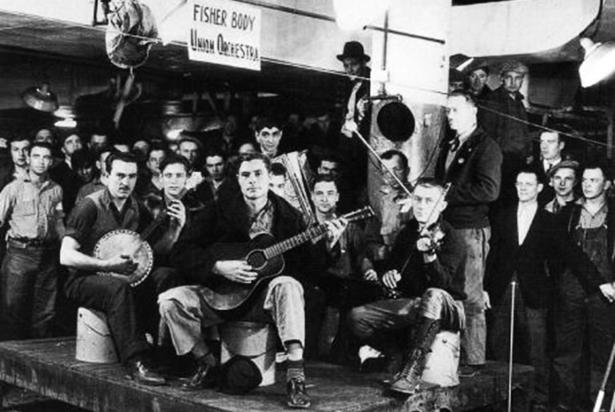A Big Loss for Labor
85 YEARS AGO, on February 27, 1939, the U.S. Supreme Court ruled that sit-down strikes were illegal and that sit-down strikers could be fired. Up until then, sit-down strikes had been one of organized workers' most effective tactics to prevent employers from using strikebreakers to continue production with plants and equipment that were involved in a labor dispute. Before the Supreme Court ruling, sit-down strikes had been successful for the unions that used them at Hormel Packing in Minnesota in 1933, at five different rubber companies in 1936 in Akron, Ohio, and in 1937, when the United Auto Workers occupied several General Motors plants for more than forty days, and repelled the efforts of the police and National Guard to retake them. https://en.wikipedia.org/wiki/NLRB_v._Fansteel_Metallurgical_Corp.
Have a suggestion for an anniversary that could be included in a future edition of This Week in People's History? Or a comment or question?
Visit Portside on Facebook and post it there.
Legal or Not, Lynching is Lynching
105 YEARS AGO, on February 28, 1919, John Snowden, a 26-year-old Black man who had been convicted of murder despite his innocence, was hanged in Annapolis, Maryland. On the day before his execution, Snowden wrote, " In a few hours from now I shall step out of time into eternity to pay the penalty of a crime I am not guilty of. God knows that I am telling the truth, and after I have been hanged, I am asking the authorities to please continue to search for the murderer. . . . I have offered up a prayer for you all. I want to thank everybody that has spent their time and money to help me. Through their song and prayer my soul was made alive and I am leaving on the everlasting Arm of Jesus. I could not leave this world with a lie in my mouth." In 1998 the John Snowden Memorial Committee was formed to lobby for Snowden's pardon, which was granted on May 31, 2001, by Maryland Governor Parris Glendening. For much more information, see https://www.arundelpatriot.org/2019/03/04/a-legal-lynching-in-annapolis…
Women Hold Up Half the Sky
160 YEARS AGO, on February 29, 1864, the three hundred members of the Troy, New York, Collar Laundry Union won their 6-day strike for a 25-percent wage increase. The strike, against 14 different commercial laundries, is memorable not only because of its success, but because it was conducted by a union with an all-female membership with a woman leader, Kate Mullany. https://hvmag.com/life-style/kate-mullany-womens-union-troy/
Nuclear Test Disaster
70 YEARS AGO, on March 1, 1954, the U.S. exploded a 15 megaton hydrogen bomb at Bikini Atoll in the Marshall Islands. It was the largest nuclear device ever tested by the U.S. and it produced more deadly radioactive fallout than any other single explosion, causing radiation sickness among at least 1300 people. International condemnation of the test gave the movement to end atmospheric testing a major boost. https://ploughshares.org/issues-analysis/article/sixty-years-under-shad…
Disability Inclusion's Ancient Roots
195 YEARS AGO, on March 2, 1829, the first school in the U.S. for people with total or partial visual impairment was established in Boston, Massachusetts. Named New England Asylum for the Blind, it was later renamed Perkins School for the Blind and moved to a 38-acre campus in nearby Watertown, where it continues to educate the visually impaired and teachers of the visually impaired. https://www.perkins.org/
This is Freedom of the Press?
105 YEARS AGO, on March 3, 1919, the U.S. Supreme Court made one of its more shameful decisions -- Schenck v. the U.S. -- which it ratified the constitutionality of the Espionage Act's ban on the creation and distribution of words on paper that opposed and denounced U.S. participation in World War 1. It was a straightforward question about the meaning of the First Amendment's text: "Congress shall make no law . . . abridging the freedom of speech, or of the press . . . " As the Supreme Court was forced to acknowledge, the accused had done nothing more that publish a leaflet that sharply criticized U.S. involvement in World War 1 and the government's policy of drafting men to fight in the war, but the court found that the government's interest in pursuing the war took trumped the First Amendment's prohibition on abridging freedom of the press. https://en.wikipedia.org/wiki/Schenck_v._United_States
Science, What Is It Good For?
55 YEARS AGO, on March 4, 1969, thousands of scientists throughout the U.S., most of whom were working at colleges and universities, halted research and cancelled many classes to gather with students and others to discuss the uses and misuses of science, particularly research related to military applications. At the Massachusetts Institute of Technology, where the day's events were initiated, most classes did not meet. Large events were also held at Columbia University, Cornell, the University of Wisconsin, the Universities of California at Berkeley, San Francisco and Irvine, Stanford and the University of Washington. The event's organization resulted in the foundation, later that year, of the Union of Concerned Scientists. https://www.ucsusa.org/


Spread the word